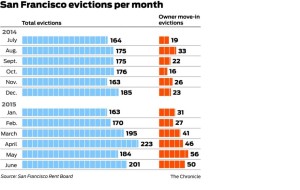The San Francisco Chronicle is reporting on the ironic consequences of San Francisco’s recently debuted “Buy-Out Legislation“, which regulates the circumstances under which landlords can discuss “payment for possession” and bestows certain extra-contractual rights on tenants (like the right to rescind such an agreement for 45 days).
In March of 2015, San Francisco’s Ordinance 225-14 became effective. It prevents landlords from even discussing payments to tenants in exchange for their vacating a rent-controlled tenancy, unless the landlord first obtains a signed disclosure form (apprising tenants of their rights under the new legislation) and then files an affidavit with the Rent Board indicating compliance. (A challenge to the constitutionality of this regulation of commercial speech is currently underway.)
San Francisco certainly has an interest in regulating the landlord-tenant relationship. And, while only the pending constitutional challenge will determine if this particular regulation is lawful, the City is already seeing the effects at the Rent Board, which records data on fault-based and non-fault evictions.
While these regulations have a wide reach, the settlement of a pending unlawful detainer action is explicitly exempted from the definition of a “Buy-Out”. So, it should surprise no one that the number of fault-based evictions has increased in response, where a “notice to quit” can serve as an icebreaker, without putting these conversations under a magnifying glass.
The new law is having a similar effect on non-fault evictions. Generally, San Francisco makes it difficult to condo-convert. In an effort to discourage the conversion of rent-controlled rental housing stock to de-controlled condominiums, the City penalizes certain non-fault evictions designed to “clear out” rental units before the conversion. Where the Subdivision Code now imposes the same penalty on Buy-Outs, landlords no longer have a disincentive to simply invoke the owner move-in provision of the Rent Ordinance and recover possession with a non-fault eviction instead of paying the premium for possession without the dark mark on their use of the property afterward.
Zacks and Freedman’s Andrew Zacks told the Chronicle, “Before, when a landlord bought a tenant out, one of the things they were willing to pay for was confidentiality and privacy . . . A lot of my clients would prefer to negotiate, to sit down and work something out . . . But because of the legislation they just go ahead and file for eviction”.
With even Supervisor Scott Weiner’s reversal of support, the Buyout Legislation may be short-lived, whether overturned by the courts or undermined from within.

